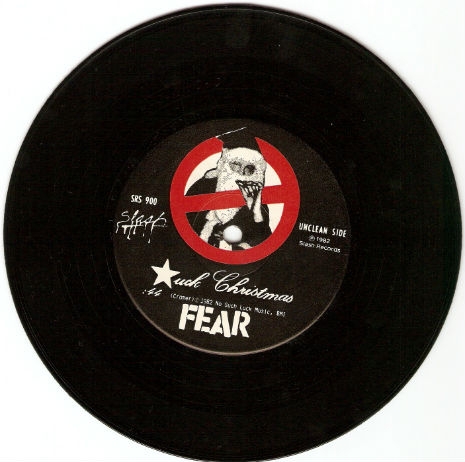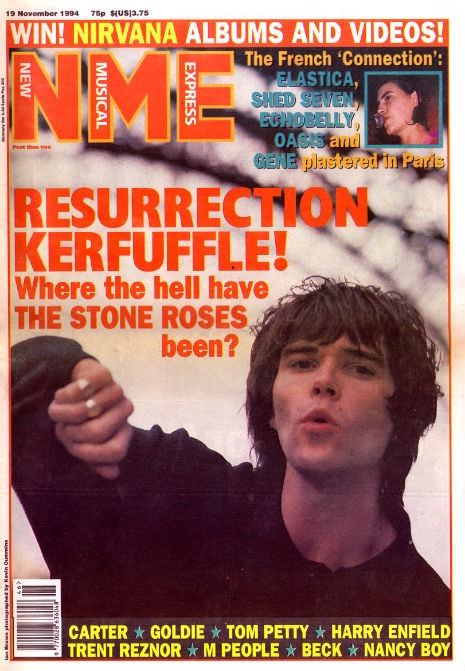
A couple of interesting music related articles have popped up in the last short while that I want to share here. Both have instigated some heated debate, but it seems to me like they both represent different sides of the same coin, namely the age old battle between the supposedly “authentic” nature of rock music and the disdain that rock snobs in turn show for “pop” music.
The first of these articles appeared in the Guardian on Thursday, and is titled “Indie Rock’s Slow and Painful Death,” by Dorian Lynskey. I’m pretty sure you can guess the content of the article by the headline alone, but here’s a taster anyway:
Just before Christmas US music writer Eric Harvey compiled a list of sales figures for the top 50 albums in Pitchfork’s end-of-year poll, inspiring the Guardian to conduct a similar exercise [re-published at the bottom of the article]. Each list prompts much the same conclusion. Of the five albums in Pitchfork’s list that sold more than 100,000 copies in the US in 2011 only two (Bon Iver and Fleet Foxes) are indie artists. In the Guardian’s top 40 the only alternative acts to pass 100,000 (the benchmark for a gold record) are Bon Iver, Fleet Foxes, Noah and the Whale, PJ Harvey, Radiohead and Laura Marling.
Of course critics’ polls are not an authoritative measure and other indie artists exceeded 100,000 sales in the US (including Wilco, Feist, the Black Keys, the Decemberists, My Morning Jacket), the UK (Elbow, Kasabian, the Vaccines, Snow Patrol, two Gallagher brothers) or both (the Strokes, Arctic Monkeys, Radiohead). If you really stretch the category then Coldplay, Foo Fighters and Florence + the Machine also did the double, and if you count 2010 releases you can add Mumford & Sons and Kings of Leon. And let’s note that, because of Spotify and YouTube, sales figures aren’t the only measure of success. That said, it’s still an unforgiving climate for the kind of crossover alternative rock act that not so long ago was taken for granted, especially when so many of the bands mentioned have been around for a decade or so and selling to loyalists rather than new fans. This sobering data invites two questions: how long will indie’s big slump last? And does it matter?
To an extent pop trends are cyclical. To borrow the language of economics, after each speculative bubble bursts (grunge, Britpop, mid-00s indie) there’s a market correction that leaves many casualties. In 1999 and 2000 there were many brilliant records but they were disparate and rarely suited to magazine covers, throwing both Select and Melody Maker into first panic and then closure, when just five years earlier it had seemed like the stream of charismatic, platinum-selling, magazine-shifting rock bands would never end. Of course just a few months later the Strokes and the White Stripes heralded a vibrant new phase, which led to the Libertines and Franz Ferdinand and then another bubble: landfill indie. By the time radio and magazines were pushing dreck such as the Automatic and the Pigeon Detectives the writing was on the wall.
While I think the thrust of this article is applicable in both the US and the UK, I feel it’s important to note that in the UK “indie rock” is seen as an actual genre of music rather than just a descriptive term for independent artists. Because to these ears “independent” is the last term that comes to mind to describe acts like Oasis, Snow Patrol, Foo Fighters, the Strokes and Mumford & Sons, and it seems somewhat absurd to judge the success of supposedly “alternative” acts on how much they sell. Also, the term “landfill indie” refers to a glut of bands whose names begin with “The” and who tend to dress similarly and make similar sounding records, who get signed for a year and release a “buzz” album, before being dropped once the PR budget runs out.
I think the real subtext of Lynskey’s article is that there is a crisis in mainstream music journalism. As less and less genuinely interesting music reaches journalists’ desks through the traditional PR channels they have relied on since the 1990s, the journalists in turn cry that “music is dead!” Because surely excessive PR spin is the only rational explanation for the acts mentioned above being considered “alternative” or “independent”? And speaking of Spin, I think it’s the same reason that magazine has decided to abandon music reviews in favour of tweets, while claiming that there are “fewer and fewer actual music consumers” (a claim which is demonstrably false, by the way.) There is no dearth of interesting and forward-thinking music being made in the world, but as is repeatedly pointed out in the article’s comments section, journalists need to look a bit harder to find it now.
The second article I have read lately that has provoked some commentary is Wallace Wylie’s “Why Pop Music Matters (No Matter What Age You Are)” on the Collapse Board website. While, again, the content of the article is explained pretty succinctly in the headline, this time it’s a bit more composed and thoughtful than Lynskey’s piece, taking in as it does criticism of both rock and pop:
The tragedy of rock music is that it went from cutting edge rebellion to conservative defender of values in a very short amount of time. Music magazines still run stories of Dylan going electric as a singular moment in rock history, and each person who reads this story shakes their heads sadly at the idea that anyone would castigate Dylan, thinking that, obviously they would have embraced this thrilling new sound. These same people then decry the current state of music and complain loudly at almost every new development, claiming that the current version of pop is some degraded, commercialised bastardisation of what music once was. Despite the obviousness of the historical lessons above, each generation still produces thousands of individuals who imagine that THIS time music really has drifted too far from its roots, that some essential quality is missing, that music has become meaningless.
Utimately, nobody can prove one way or the other whether ‘music’ was ever good or bad, and to think that anybody can launch a rational argument based around the idea that the entire musical output of a new generation is somehow not meeting some in-built standard is foolish beyond words. No art form or style has ever held firm amid the onslaught of modernisation and emerged the victor. The only thing able to somewhat succeed in ending innovative thinking and inevitable change thus far has been murderous totalitarian governments. Left to their own devices, many artists willfully experiment, and those in the commercial field are no different. This is not to say that pop music is above criticism. If pop music has a problem, however, it is in its process and in its reception. While the music plays on regardless, an intellectual war rages beneath the surface. With charges of frivolity thrown constantly at pop, postmodernism came to its rescue, bringing a brand new set of problems in its wake.
There is something rotten at pop’s core. While it is undoubtedly more welcoming to women and non-whites, it has a tendency to use and discard those same people at will. Women’s looks are under constant scrutiny in the world of pop, to the extent that a little extra weight can undermine a performer’s entire career. Once a person’s moment under the spotlight is over, hosts of cackling jackals take great delight in declaring that person a non-entity. Pop worships at the altar of youth and beauty, and anyone deemed old or ugly should probably wander off into the cold and die the moment their time in the spotlight is over.
It’s important to note that there are differences, of course, between popular music culture in the US and the UK, but Wylie addresses this in his article (being a British writer based in America writing for an Australian site, he’s well aware of these differences.) But I’m with Wylie on this. “Pop” is just as valid a “genre” as any other you’d care to mention, and I have an innate distrust of those who dismiss pop music out of hand. It seems nonsensical to me to disregard any music simply because it is popular, just as it would be nonsensical to dismiss all music made before an arbitrary year like, say, 1974. It’s not a sign of having more developed and advanced taste I’m afraid, it’s actually the exact opposite - your taste must be pretty weak if it is swayed by the amount of people who enjoy a song rather than the song itself.
What is more interesting to me though are the core arguments that get bandied about in relation to the perceived “authenticity” of rock music as opposed to pop, and how these notions can lead to enjoyment of pop music being seen as shameful. As Wylie mentions in the comments to this piece, an artist like Neil Young is perceived as being somehow more “authentic” than, say, Missy Elliot, despite coming from an upper middle class family with a famous father, while Elliot came from a truly impoverished broken home and had to fight harder to achieve her popular status. There is another excellent Collapse Board article on this same issue that music fans should also read: “Everything Is Plastic: The Corrupting Ideal of Authenticity In Music” by Scott Creney.
There’s much food for thought to chew on in these articles, but it’s important for me to re-state here on DM—a site where only last week a newish rock band experimenting with electronics called Errors got dismissed as being clones of, err, Hawkwind?!—that following music is now easier than ever. It’s as accessible as simply surfing the net, and as mystifyingly off-putting to older generations as that pass time can be, too. It’s the lame-ass reason that Spin is cutting its reviews (because the audience can hear the music before the review is read - yes, that is what they said!), it’s why Dorian Lynskey’s desk is overflowing with dross, and why shitty “indie rock” matters less now than it ever did.
NOBODY is too old for pop music, or even the music of the younger generations, regardless of genre. I’ll leave you with this quote from Wallace Wylie:
When a music fan starts to imagine that the essential sprit of music lies in holding on to an old idea rather than embracing a new one, it’s probably fair to say that they have become something of a musical conservative. I say this without labeling myself the most forward thinking of listeners. I merely state it as an absolute, unarguable fact.
Further reading:
Wallace Wylie: “Why Pop Music Matters (No Matter What Age You Are)”
Dorian Lynskey “Indie Rock’s Slow & Painful Death”
Scott Creney “Everything is Plastic: The Corrupting Ideal of Authenticity In Music”
Slate.com “Spin Magazine To Review Albums On Twitter: Is This the Death Of Music Criticism?







